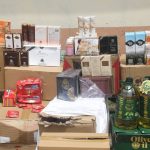The Lagos State government is battling a cholera outbreak at Kirikiri Medium Security Prison.
In a statement released on Sunday, Director of Public Affairs, Tunbosun Ogunbanwo, quoted Lagos State Commissioner for Health, Professor Akin Abayomi, saying that 25 cases of severe gastroenteritis caused by cholera were reported at the prison.
“Urgent medical and environmental intervention measures have been implemented with success,” said Professor Abayomi.
“We were able to supply Kirikiri Medium Prison with intravenous fluids, infection prevention, and other health consumables. Additionally, the World Health Organization has donated 10,000 doses of pharmaceuticals to support the prison health facilities for about 3,200 inmates if required. Immediate water and sanitation issues have been corrected, and there are ongoing inspections of other correctional facilities in the state,” Abayomi explained.
The Lagos State government has announced a significant improvement in daily cholera cases from the spike reported two weeks ago but acknowledged evidence of ongoing low-grade community transmission. “Few cases are still presenting to hospitals across the state,” noted Abayomi.
During the “One Health” inter-governmental agency strategic meeting, Professor Abayomi revealed that no new cholera-related deaths have been reported in the last 72 hours. “The government is intensifying countermeasures to completely eliminate transmission,” he stated.
Professor Abayomi attributed the reduction in new cases and absence of new deaths to effective interventions and residents adhering to public health advice.
The source of the original outbreak has been traced to unregulated street beverages and contaminated water supply. “Many samples from popular street beverages confirmed the presence of vibrio cholera bacteria, the cause of cholera,” Abayomi disclosed.
“All of the containers had no NAFDAC accreditation numbers, indicating they are small cottage backyard informal production units. Identifying the precise location of manufacture has proven difficult and the directorate of environmental health is planning to seal any such unregulated manufacture and make arrests of anybody involved with the manufacture or distribution of beverages without NAFDAC numbers,” said Abayomi.
The state government is enforcing environmental health countermeasures through its interagency “One Health” approach. This includes widespread sanitation activities, inspection and disinfection of boreholes, supplying potable water to affected local governments, and enforcing stricter regulations on local beverage manufacturers.
“Henceforth, a higher sanitary and regulatory standard of eateries, food handlers, beverage manufacturers, and groundwater will be implemented and enforced to curb the burden of food and water-borne diseases in Lagos,” Abayomi added.
The commissioner emphasized the need for continued vigilance and adherence to public health measures.
He urged the public to take personal responsibility for consuming safe water, food, and beverages, maintaining good personal hygiene, and seeking immediate medical attention if symptoms of diarrhea and vomiting develop. Treatment of suspected cholera remains free in all government hospitals.
“There is no need for the public to panic,” reassured Professor Abayomi. “With continued collaboration, vigilance, and commitment from all stakeholders, the state is taking decisive actions to effectively combat and control the spread of cholera, safeguarding the health and well-being of its residents.”











